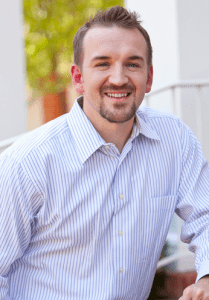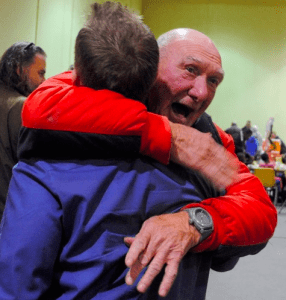 This past July, while I was on my study break and away from the church I serve, one of my favorite people in church passed away. His name is Roy Willis, and I would love to introduce you to him.
This past July, while I was on my study break and away from the church I serve, one of my favorite people in church passed away. His name is Roy Willis, and I would love to introduce you to him.
Brother Roy used to get up around 6:30 on Sunday mornings to walk to church. He couldn’t drive, and didn’t have a car, but for the first few years at Highland, he would beat me to church. He got up so early because he served communion every Sunday and it was the highlight of his week.
Brother Roy had lots of challenges in life. He never had great health, he lived consistently below the poverty line, he had trouble communicating clearly, and he struggled with some mental setbacks, but on Sunday morning Brother Roy was more than a summary of any of those things. On Sunday morning Brother Roy got up early and walked to church because he was a part of the body of Christ. We needed him, and he needed us.
I heard about Brother Roy’s death the same week that I read for the first time Nietzsche’s little, but incredibly influential book called “The Genealogy of Morals”. And it set off in me a kind of internal conversation that I would like to invite you into.
Whether you have read Nietzsche or not, you are constantly being inundated with his profound, brilliant, and cold ideas. He has influenced the world with his genius and cynicism, and I would bet most of us have his voice in the back of our minds every day, whether we know it or not.
 Here is the basic sketch of his book: In any society there are two groups of people, the strong and the weak. The strong are those who are more talented, gifted, intelligent, and beautiful. The weak are not any of those things.
Here is the basic sketch of his book: In any society there are two groups of people, the strong and the weak. The strong are those who are more talented, gifted, intelligent, and beautiful. The weak are not any of those things.
The strong accumulate power because they are more talented and gifted than others. And the weak, because they lost their power by being outwitted or outperformed, must come up with a way of fighting back. So these weak people create an ethic that helps them fight back against the powerful.
Things like “you should give to those who have less” or “help those less fortunate than you” sound like just common sense because they have been around so long, but Nietzsche is brutal here. This is just what he calls “slave morality” invented by the Jews/Christians. His main idea is that weak people had to invent God so that their suffering could actually have meaning.
So we invent God to make us feel better about our miserable, poor, weak lives and in the process, we create a slave morality that prevents others (at least a small group of others…the strong) from achieving greatness. This slave morality keeps people down by making them feel guilty and ashamed about all the people they are leaving behind.
Here is how he says it: The sick are the greatest danger for the healthy; it is not from the strongest that harm comes to the strong, but from the weakest.
To be fair, Nietzsche had plenty to criticize, and the priests and pastors are the ones he seems to be the hardest on.
The priest must be accepted by us as the predestined savior, herdsman, and champion of the sick herd: thereby do we first understand his awful historic mission. The lordship over sufferers is his kingdom, to that points his instinct, in that he finds his own special art, his master-skill, his kind of happiness.
In other words, the people and priests who are fighting against injustice, working against oppression, trying to live lives for the people who are “beneath” them are really just the ninja’s of slave morality. This is their will to power. This is how they feel superior; by giving to the least of these, they are reminding themselves and others, they aren’t the least of these.
The truth is you have seen this a thousand times, Nietzsche is often right. I’ve noticed this in others and myself. Sometimes I care more about looking a certain way or getting my way than the person I actually say I want to help.
Sometimes ministers/priests/non-profit leaders are just using other people for their will to power. But not always.
And now back to Brother Roy. One of the things that disturbs me about a Post-Christian culture, is that my friends like Brother Roy won’t have a home.
I read Nietzsche because I think he sees with clearer eyes than almost anyone, what Christianity has done, even though he has grown to hate it. I read Nietzsche because at least he has the good manners to despise Christianity for what it actually is.
He may have hated specific Christians because of their hypocrisy, but he hated the whole system because how it enabled the weak and sick, and held back the strong. He never had the silly notion that compassion was just the default state of humanity or that Christian History was really just a sequence of violent wars, sexual neurosis and repression. He knew what Christianity was, what it had done and he wanted it to stop.
And he saw from trajectory of 19th century Europe that it was;
“Christianity [will], there is no doubt about it – go to pieces: this is that great hundred-act play that is reserved for the next two centuries of Europe, the most terrible, the most mysterious, and perhaps also the most hopeful of all plays.
He envisioned a secularized, disenchanted world that will make a way for the strong to be stronger, and the rich to get richer. And he has largely seen the future of the Western world correctly.
Sure right now, we still have enough Jewish/Christian roots that we keep pulling for the underdog, we still want be generous to the poor, and make the world a more fair place, or at least we think we ought to do that, but Nietzsche knows that this morality came from Christianity and as we slowly abandon it we are also abandoning the things we take for granted.
I am aware that I am doing the very thing that Nietzsche rails against, being the pastor who invokes your pity trying to get you to cave to a slave morality and so complete my will to power. But there is one thing that I think Nietzsche fails to realize. It is not just pity that drives me to love Brother Roy, and it is not just hope in the afterlife, it is that Jesus has taught me that I am not better than Brother Roy or any “weak” person, precisely because Jesus is how God became that weak person while still being God.
On my better days, I don’t serve people to feel superior, or fight for them to gain power, on my better days I do it for the great joy of life (Something Nietzsche cared a lot about).
I do it because I have come to believe that those weak people that we are tempted to dismiss are actually strong in lots of ways that are overlooked by those who are strong in their own eyes. They actually have taught me about a joy beyond the walls of the world that is alive inside of them. I learned joy from Brother Roy not by serving him, but by watching his joy grow in gaining the dignity of serving others.
I reject the cynicism of Nietzsche that sees through all generosity and charity as a masked power-play and yet I greatly appreciate the way he lays the world bare.
This is what the world looks like without the Jewish Christian faith, we didn’t just evolve to this morality. This is not the default nature of people. This ethic was given to us, either by God or the devils of slave morality. It is either very good or very bad.
And we get to choose.
I choose Brother Roy.











